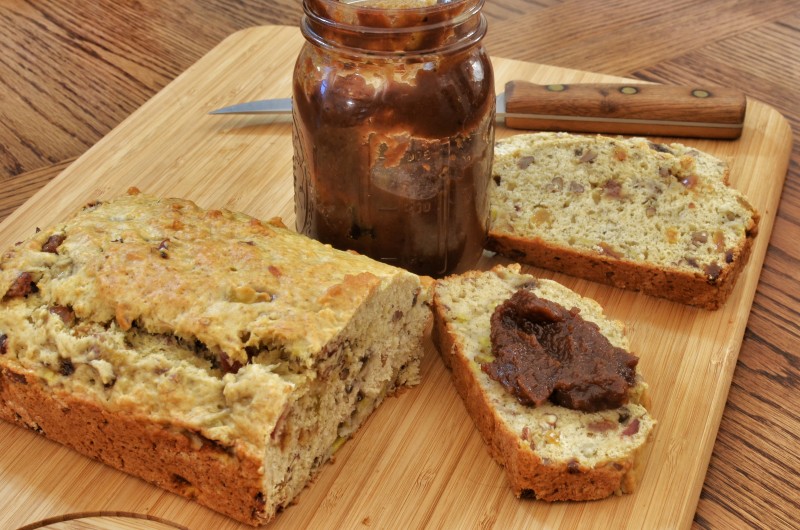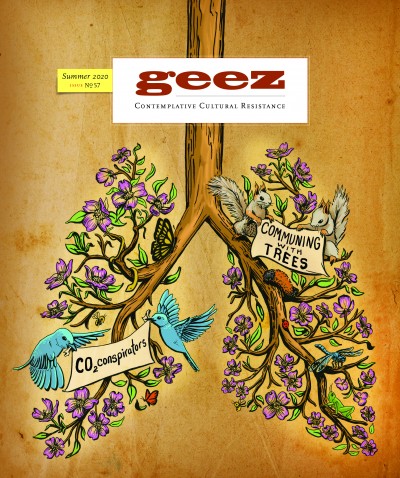A Land Managefesta: Bread and Roses from the Forest

Mmm... banana nut bread with apple butter jeffreyw CC
I am a consulting forester in Central Pennsylvania within the Chesapeake Bay Watershed.
I plant trees and shrubs to provide food for landowners and wildlife and also to beautify the forests.
In recent years, I have transitioned to planting tree crops. I walk with landowners around their properties, listen to them talk about their desires for the land, and look for what the ecosystems need most. In 2019, I planted 8,000 native trees and shrubs at the intersection of ecosystem function and economic opportunities such as fodder, fuel, fiber, flowers, and food.
The transition toward a new forest economy and right relationship with native ecosystems provides solutions in the late stages of industrial collapse. Trees save us. They produce oxygen. They feed us. They feed the soil. They keep our water clean. And they hold the land and our hearts together. We gather around them, bury our dead under them, and make sweet honey from them. Trees are both our bread and our roses.
The original Bread and Roses Movement originated in 1912 when over 10,000 workers went on strike in the textile mills of Lawrence, Massachusetts. It is said that the spirit of the workers, singing and dancing together, is what made them so dangerous to the boss. During one of the marches a woman carried a sign in protest referencing a 1911 song, “We Want Bread But We Want Roses Too,” calling for rights that were greater than basic subsistence, more than the bare minimum, but included the gift of beauty. Their movement for bread and roses spread, and their demands were granted to over 275,000 textile workers.
That decade saw not only a great transformation in labour, but also in the forests of the eastern United States. Things were about to change drastically. In 1912, the chestnut blight had been in the United States for a decade, slowly radiating outward from New York City. The death of these “redwoods of the east” was imminent, with 3 million trees destined to fall over the next decade (one in every four trees).
The great American chestnuts of Appalachia were thought to be indestructible. Their canopy was ideal for carpentry. They served as a backbone for the economy and ecology. And they were delicious for humans and wildlife alike. It is said that squirrels could travel from Georgia to Maine within American chestnut trees alone and never touch the ground.
The chestnut blight was the first look at the unintended consequences of a non-native invasive pest to a bioregion. It led to what some consider the greatest ecological catastrophe of all time. Not only was this loss devastating to the tree, but also to the forest. It was the beginning of invasive diseases and species that continue to threaten the resiliency of our forests.
We are now in a similar time between the infestation and the falling of the trees. Industrial capitalism has always destroyed the natural and human capital on which it depends, and now the consequences are becoming more clear.
If we cannot move beyond industrial capitalism – with its pharmaceutical corporations, for-profit health care, and privatization of resources necessary to survive (such as drinking water) – global pandemics will become the new norm. The destruction and suffering of short-term profit-driven extraction poisons us and commodifies our labor.
However, already in this era of COVID-19, labour strikes are growing in mega-corporations like Whole Foods and Amazon. Employees are demanding basic human rights through guaranteed hazard pay, paid medical leave, and other common-sense safety protocols. Workers and citizens all over the world are calling for rent strikes, student debt relief, boycotts of businesses that are not protecting employees or producing necessary equipment, and hunger strikes to release the detained.
We are circling around a turning point. If we continue along this path of commodification of our resources, global pandemics will continue occurring and the impacts of climate change will become more abrupt and extreme. The answers for thriving economies and our well-being are found in planting and maintaining our forests, growing our medicine cabinets, making our own oils from tree crops, foraging and growing our bread and roses of the forest, and developing a greater intimacy of how to manage these goods and services.
We are not going to be the same after this. As disasters shake loose the old-world order, our path is made by walking. It is up to us. We are trailblazing in new (and old) economies of abundance and sharing.
The COVID-19 pandemic is shredding the fabric, and the economic fallout will leave many with rags and stitches. Let’s find the new seams. Let’s propagate the bread and roses of the forest and reorganize our labour around it. We need the new “Johnny Appleseeds” of the world now more than ever. But we need intersectional versions of him – envision Annie Pawpaw, Elijah Elderberry, and Joey Persimmon – pursuing decolonizing, sustainable community development through ecosystem renewal.
Andrea Ferich is a consulting forester focusing on the implementation of agroforestry systems with private landowners. She has worked in sustainable agriculture, ecological restoration, and watershed management for the last twenty years from Camden, NJ to Central PA. She enjoys propagating plants and birdwatching. Read more about her work at www.ironwoodforestry.guru
Image credit: September 21, 2014, “Mmm… banana nut bread with apple butter,” jeffreyw CC, Flickr.



Start the Discussion